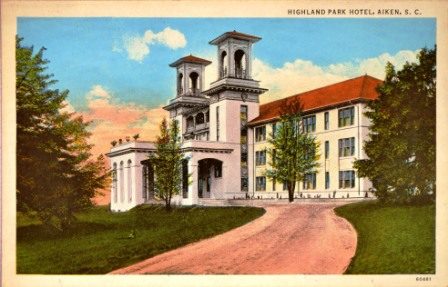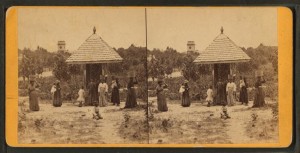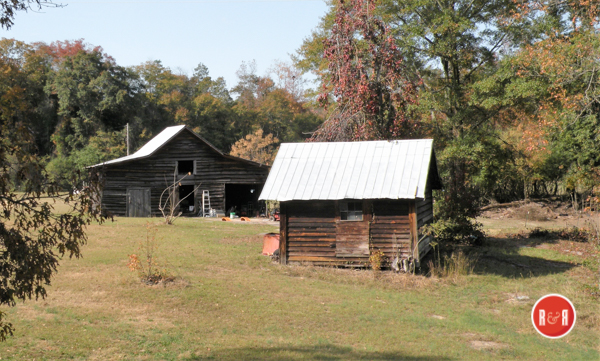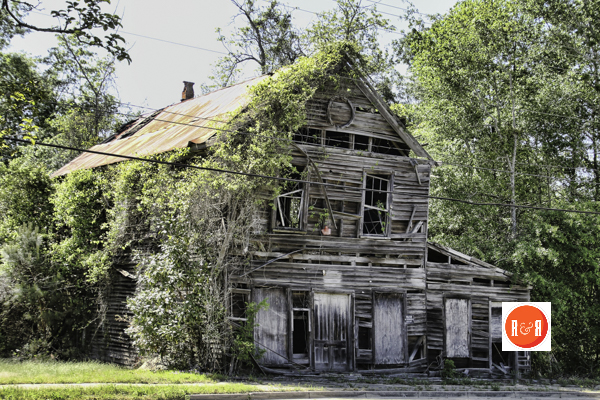AIKEN COUNTY HISTORY
“One’s impressions of a place are very apt to be made up by the manner of his reception wherever he goes. It was this traveller’s rare good luck to have been received by two gentlemen of Aiken, one a lawyer and the other a hotel keeper. The hotel keeper was Mr. B. P. Chatfield, the lawyer, the Hon. D.S. Henderson, both of whom selected Aiken many years ago as the place in which to cast their fortunes.
You alight at Aiken on the platform of one of the neatest and best appointed stations on any line of railway in South Carolina. The depot has been practically rebuilt. It is neat in its architectural design and is built evidently for the convenience of those who sometimes in the nature of things “must wait on the train.” If waiting is necessary, then by all means go to the Aiken depot to do the waiting. There is a handsomely furnished room for the ladies and another for gentlemen who haven’t the good fortune to be in attendance upon fair friends. In the centre of the building is the private office of Mrs. North, who presides over the business of the South Carolina Railway at Aiken—a lady of whom both in her business and social relations there are heard golden opinions on all sides. Her assistant is Mr. A.M. Willard, who is polite and attentive, with an eye single to the interests of his company and whose special function is to see that the wrong person does not get the right baggage and vice versa.

Courtesy of the Wingard Collection – 2013
It was learned from Mr. Henderson that the town and county were called Aiken in honor of one of South Carolina’s old-time governors. Mr. Henderson went there in 1872 when the town contained about an even 1,000 inhabitants and when there were only two lawyers at the Bar. Each of the streets was named after a county in the State, but the baptism must be renewed before long. There must be added a Florence Street and a Graven Street as soon as the Berkeley politicians shall have “created” their new county.
The first look at the streets is obtained when the visitor passes up hill from the depot and enters the main thoroughfare, Park Avenue. There is no finer anywhere, and this is stated without mental reserve. Its beauty begins opposite the depot, near which is the Park Avenue Hotel, with its long and tasteful white front, half-shaded from view by the line of white oaks along the pavement.
The Yorkville Enquirer reported on Nov. 9, 1882 – “Three scientist from Germany were in Aiken to observe the transit of Venues. They are staying at the Park Ave. Hotel. The transit will occur on Dec. 6th.”
The Yorkville Enquirer reported on Jan. 6, 1892 – “That 93 northern visitors registered at various hotels in Aiken last week.”
Aiken, it might here be mentioned, is a city of hotels, modem hotels and modem boarding houses. At this time the streets, although well kept, indicate nothing of the charming and graceful appearance they present in the spring or summer. There are lines of trees on the grand boulevard, along the pavements, and on either side of two macadamized drives. In the middle of these streets are parks planted in cedar, rose trees, and the usual garden stock. This is a feature which is peculiar to Aiken, for it is about the only one of the summer resorts the streets of which are spacious enough to do duty as streets with room enough to spare for public parks. On this avenue are some of the finest dwelling places imaginable. As a rule they are all recessed from the streets, leaving spaces for gardens unsurpassed anywhere for the luxuriance of what they contain and in the manner in which they are presented to the view of the passerby.
The people, it might be noted, have all the salient characteristics of the four greatest counties in the State—Edgefield, Orangeburg, Lexington, and Barnwell, as out of these four the present county of Aiken was formed. Knowing what the people of these counties are, it is quite easy to imagine what their traits must be when concentrated in the modem son or daughter of the Aikenites. …..progress must have a starting point, and it is conceded that the present evolution of Aiken began when the Highland Park Hotel was built way back in 1869 or thereabouts. The

The Miriam and Ira D. Wallach Division of Art, Prints and Photographs: Photography Collection, The New York Public Library. The New York Public Library Digital Collections.
hotel was the pioneer of modem hotels in the South. It made Aiken and it gave the impulse to Northern travel to the South, which is one of the great factors in its present development. Mr. B.P. Chatfield, its proprietor, came to Aiken, built his hotel at first on a modest scale, but has since added to it so largely that it is now among the first in the Southern States. It is the winter home of the best class of Northern tourists. It contains all that human ease and comfort desire, and especially for that invalid class with whom attention and courtesy count so much in what is left to them of this mortal life. It is situated on a high bluff overlooking the ravine on the west through which the South Carolina Railway runs and crowns a hill which descends, by natural terraces, to the railway embankment.
One of the newest of the enterprises in which Aiken capital is invested is the Aiken Land and Improvement Company. The lands of the company are the Bauskett and other tracts which lie along the Aiken and Edgefield branch of the Carolina, Cumberland Gap, and Chicago Railroad, about ten miles from Aiken at Lake View Station. It is proposed to restore the old water power on the tract and to establish a new cotton factory and a wood pulp factory. The lands also contain brown sandstone in abundance and fine brick clay. Dr. T.G. Croft and Mr. B.R Chatfield are largely interested in the company, as are also some Northern capitalists. It was stated yesterday that there was a probability that work would be begun on the lands in a short time. With the reconstruction proposed, a 500-horsepower can be had, the supply of water being from one of the most extensive reservoirs in the county. t is not out of place to mention here that an old Charlestonian, Dr. Charles F. McGahan, is the resident physician at the hotel. He is provided for in one of the handsomest rooms of the building and is enjoying a fair share of that good fortune that follows deserving Charlestonians the world over.
Among them are Courtney & Co., wholesale and retail grocers; C.K. Henderson, a large wholesale and retail clothing house; H. Hahn & Co., general merchandise, two large stores; Shroder & Thorp, same business as Hahn & Co.; H.F. Wameke, bakery; C. Klatte, merchandise and liquors (Mr. Klatte is a brother of Capt. Herman Klatte of this city); Robert Powell, wholesale and retail groceries; F. Voght, hardware; and H. Busch & Co., general merchandise. In the druggist line are H.H. Hall (a brother of Jordan Hall of this city), W.J. Platt, and W.H. Harbers. All these merchants have the option of three large banks: The Bank of Aiken, F. B. Henderson, president, WW. Muckenfuss (a Charlestonian), cashier; the Aiken County Loan and Savings Bank, W.W. Woolsey, president, J.W. Ashurst, cashier; and the private bank of J.H. Beckman. The impression is that all these presidents and cashiers are millionaires, at least the institutions mentioned are on a sound financial basis.

Image at Chinquapin Falls by photographer Ann L. Helms – 2018
With the schools the churches go hand-in-hand. There are the Episcopal Church, the Rev. E.C. Edgerton; the Presbyterian Church, the Rev. J.C. Odder; the Baptist Church, the Rev. L. Cuthbert; the Methodist Church, the Rev. R.H. Jones; and the Catholic Church, a mission. There are, of course, colored churches of all known and unknown denominations for the colored people. There is an Aiken Bar, which ranks high among the legal fraternity. Of these the most prominent are: D.S. and E.P. Henderson, G.W. Croft, W.G. Chaffee, James Aldrich, Walter Ashley, W. Quitman Davis, Col. C.E. Sawyer, O.C. Jordan, M.B. Woodward, F.A. Emanuel, Harland Stevenson, E.S. Hammond, and John Gary Evans.
The faces of a good many of these gentlemen whom the correspondent met yesterday recalled to him very forcibly the famous Deadlock Convention of 1888. The Convention also reminded him of the Recorder, edited by Mr. Ford, and the Journal and Review, edited by Mr. Ligon, both of which are invaluable institutions in Aiken. Both of these gentlemen have lost that look of weariness and tiredness which was epidemic in the town when the Convention was in session and things were red hot, night and day, at the Tillman, Henderson, and Aldrich headquarters respectively. In those days and now it was, and is, well that Aiken could boast of such a municipal and peace department as it now possesses. The names of these are all that will be necessary to give their biography: Intendant, F.E. Sommer; Wardens, B.P. Chatfield, H. Hahn, H. Busch, John Phillips, and J.C. Courtney; Gerk, J.R. Jordan. The county authorities, most of them making Aiken their home, are W.W. Williams, master in equity; B.F. Turner, sheriff; J.H. Hawkinson, clerk of court; D. H. Wise, auditor; J.T. Gaston, probate judge; J.D. Murray, treasurer; D.H. Crossland, school commissioner; and J.A. West, S. A. Hadley, andEldrige Sumter, county commissioners.
The products of the county come to Aiken, especially cotton, but the receipts must in time be largely diminished by the business done by the Blackville, Alston, and Newberry Railway. There will, however, possibly be a gain along the Edgefield and Aiken branch of the Carolina, Cumberland Gap, and Chicago Railway, which is now in active operation. This, with the South Carolina Railway, has made Aiken a competing point, which has secured a reduction of freight from Aiken to Chester of about 20 per cent. They have by their splendid railway facilities four mails a day, the best thing which they bring in the line of literature being the News and Courier, of which Miss L.M. Carson is the active and enterprising agent in Aiken.” News and Courier, January 25,1889.
Information partly from: Names in South Carolina by C.H. Neuffer, Published by the S.C. Dept. of English, USC
